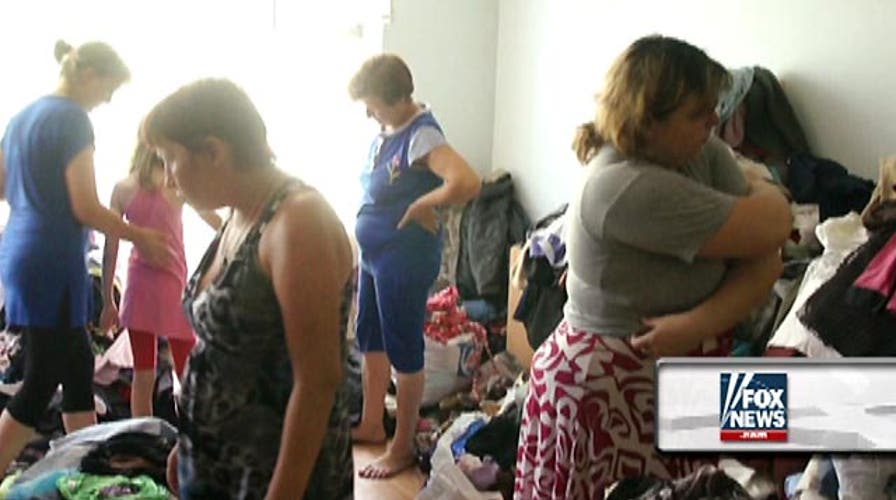VORONEZH, Russia – In a diplomatic game of chicken, a large Russian aid convoy rolled toward the Ukrainian border on Thursday -- but it was heading toward a crossing controlled by pro-Russian rebels instead of a government post as Ukraine had demanded.
Ukraine's government threatened to block the convoy if the cargo could not be inspected and announced it was organizing its own aid shipment to the war-wracked separatist region of Luhansk.
Later, it also declared it had taken the eastern town of Novosvitlivka, which lies just south of Luhansk, which means it could block the Russian aid from reaching the war-wracked city.
Ukraine suspects the convoy could be a pretext for a Russian military invasion or further support for the pro-Russian rebels it has been fighting since April.
The Russian convoy of more than 200 vehicles had been parked at a military depot in the southern Russian city of Voronezh since late Tuesday amid disagreement over how and where the aid could be delivered to eastern Ukraine, where government troops are battling armed separatists.
But on Thursday, the white-tarped trucks, some flying the red flag of Moscow and accompanied by military vehicles, drove down a winding highway through sunflower fields and green hills then turned west toward the rebel-held border crossing of Izvaryne.
But the trucks soon pulled off about 17 miles from the border and parked in a large field where dozens of beige tents had been set up. Drivers in matching delivery outfits got out and relaxed, making it unclear whether the convoy would cross into Ukraine later in the day or spend the night on Russian soil.
The route suggested Russia was intent on not abiding by a tentative agreement to deliver aid to a government-controlled border checkpoint in the Kharkiv region, where it could more easily be inspected by Ukraine and the Red Cross. Moscow has insisted it coordinated the dispatch of the goods, which it says range from baby food and canned meat to portable generators and sleeping bags, with the International Committee of the Red Cross.
ICRC spokeswoman Anastasia Isyuk said talks between the organization, Ukraine and Russia were continuing but she could not confirm where the Russian convoy was headed.
"The plans keep changing, the discussions are going ahead and we will not confirm for sure until we know an agreement has been reached," Isyuk said in Geneva.
Russia's Foreign Ministry says the convoy has 262 vehicles, including about 200 trucks carrying aid.
Russian President Vladimir Putin, meanwhile, addressed hundreds of lawmakers Thursday in the Black Sea resort of Yalta in Crimea, which was annexed by Russia from Ukraine in March. He did not speak specifically about the convoy.
In a relatively subdued address, Putin said Russia's goal was "to stop bloodshed in Ukraine as soon as possible." Moscow should improve life in Ukraine "without building a wall from the West," he said, but asserted that Russia would "not allow anyone to treat us with arrogance."
The Ukrainian government in Kiev countered Putin's aid convoy by announcing one of its own.
Ukrainian Infrastructure Minister Maxim Burbak said three convoys totaling 75 trucks were transporting 800 tons of humanitarian aid from Kiev and the cities of Kharkiv and Dnipropetrovsk -- including grain, sugar and canned food -- destined for Luhansk.
Leaders in Ukraine and the West have accused Moscow of providing arms and expertise to the pro-Russian rebels in east Ukraine, who have been battling government forces since April. Moscow has denied those charges, but the breakdown in communication over the aid has stoked fears of Russian intervention.
Ukrainian forces have stepped up efforts in the last few weeks to dislodge the separatists from their last strongholds in Donetsk and Luhansk, and there was more heavy shelling overnight.
The sounds of artillery fire and blasts could be heard all over Donetsk. Shells hit two shopping complexes in the city, authorities said, urging citizens to stay off the streets.
Valentina Smirnova, a resident of Donetsk, cleaned up broken glass and rubble Thursday in her damaged kitchen.
"My son left and now I am staying with my daughter. I don't know what to do afterwards. Where should I run to after that? Please tell me!" she said, tears welling up.
The U.N.'s human rights office in Geneva announced Wednesday that the death toll in eastern Ukraine had nearly doubled in the last two weeks. It said its "very conservative estimates" showed the overall death toll rose to at least 2,086 people as of Aug. 10, up from 1,129 on July 26.

